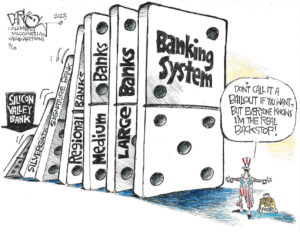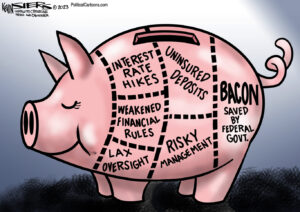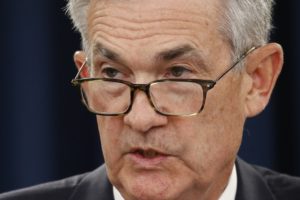The Shame Beneath Inaugural Hoopla
Sorry to rain on the inaugural parade, but we need to find a better way to pay for these things. The financing of President-elect Barack Obama's big day is just as much of an embarrassment to the country as the financing of inaugurations past.Ah, the gowns and the glitter. The spectacular opening concert featuring everyone from Beyoncé to The Boss. The historical drama of watching the first African-American take the oath as president of the United States.
The quadrennial conundrum over how to pay for it all.
Sorry to rain on the inaugural parade, but we need to find a better way. The financing of President-elect Barack Obama’s big day is just as much of an embarrassment to the country as the financing of inaugurations past.
First we force financially strapped municipal and state governments — particularly the District of Columbia — to pay enormous costs for security, transportation and emergency preparedness that simply shouldn’t be their responsibility. Then, because we want to stage an extravaganza that is as big and as bountiful as the day seems to require, we have the president-elect tap the same deep-pocketed donors who finance political campaigns.
Obama’s inaugural committee stresses that it has imposed unprecedented limits on donations, banning direct contributions from corporations, lobbyists and unions and limiting individual contributions to $50,000. “This is not business as usual,” inaugural spokeswoman Linda Douglass says.
Still, the committee has allowed “bundlers” — the well-heeled political fundraisers who tap their well-heeled friends and colleagues for donations — to get credited for raising up to $300,000 a piece. Substantively, what is the difference between an individual who writes a $300,000 check and a “bundler” who raises that amount and gets noted in the books for providing this service?
“I don’t think it’s all that different,” says Alexander Cohen, senior researcher for the watchdog group Public Citizen. “I think it’s a way to get around the donor limits — why have bundling if you have donor limits? The answer is, of course, to get around those limits.”
Cohen, who analyzes the inaugural committee’s disclosures as they are made public, says that as of Tuesday, 78 percent of disclosed donations have come from bundlers or contributors who have given $25,000 or more. An analysis he provided to The Wall Street Journal last week showed that as a group, employees and executives of Wall Street financial-services firms, including companies that have received billions in federal bailout funds, are among the heaviest contributors. “I don’t see a lot of priests on the lists,” Cohen told me.
Obama’s intentions may well be better than those of George W. Bush, who set a limit of $250,000 on individual donations in 2004 and allowed corporations and lobbyists to contribute. But the financing apparatus still bears an unseemly resemblance to our unacceptable campaign-finance system.
A part of inaugural financing that almost certainly will be worse this year is the portion that comes from the District of Columbia government and, because next week’s swearing-in is expected to draw a record crowd of about 2 million, is set to be the costliest in history. Washington Mayor Adrian Fenty, whose city already faces a budget shortfall due to the weak economy (and which already cut funds for housing, health care and transportation to close last year’s budget gap), has told Congress that municipal inaugural costs are expected to balloon to $47 million. That’s about triple Washington’s cost four years ago.
Because of the enormous crowds and the strain on regional transportation and emergency systems, the governors of Maryland and Virginia also have complained. The three jurisdictions estimate a total expenditure of about $75 million — yet Congress has so far allocated just $15 million to the District of Columbia government to defray its expense. At Fenty’s request, Bush has declared the inauguration to be a federal “emergency” so that additional federal funds can be made available, but it is unclear how much extra money will result.
This convoluted jumble of private fundraising and public demands on the budgets of squeezed local governments — not to mention the bureaucratically necessary but inane designation of “emergency” for an event that occurs every four years — is shameful. The inauguration of a president is a nonpartisan event and a national day of celebration, as well as a constitutional requirement.
We need to rid inaugurations of both the tawdriness of campaign-style fundraising and the terrible inequity of forcing local governments to pay for them. The only way to do that is full public financing.
Marie Cocco’s e-mail address is mariecocco(at)washpost.com.
© 2009, Washington Post Writers Group
Your support matters…Independent journalism is under threat and overshadowed by heavily funded mainstream media.
You can help level the playing field. Become a member.
Your tax-deductible contribution keeps us digging beneath the headlines to give you thought-provoking, investigative reporting and analysis that unearths what's really happening- without compromise.
Give today to support our courageous, independent journalists.




You need to be a supporter to comment.
There are currently no responses to this article.
Be the first to respond.